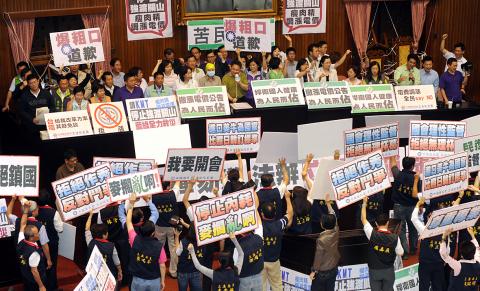Citizen’s Congress Watch (CCW) yesterday said President Ma Ying-jeou (馬英九) — who doubles as Chinese Nationalist Party (KMT) chairman — was responsible for the paralysis in the Legislative Yuan, urging the ruling party to put aside the controversial beef amendment to allow other bills to be reviewed.
Since Monday, Democratic Progressive Party (DPP) and Taiwan Solidarity Union legislators have filibustered the legislative session in a bid to prevent the KMT from passing amendments to the Act Governing Food Sanitation (食品衛生管理法) that would allow US beef containing residues of the leanness enhancing livestock feed additive ractopamine into Taiwan.
While KMT lawmakers have condemned the opposition parties for stalling the legislature, CCW said it was the KMT — more specifically Ma — who should be held responsible.

Photo: Lo Pei-der, Taipei Times
“Since the beginning of the legislative session [in February], only 11 bills have been passed, making this session one of the least productive in Taiwan’s history,” CCW executive director Chang Hung-lin (張宏林) told a news conference. “One of the reasons is that Ma is trying to push through too many controversial bills — such as increasing utility prices and lifting the ban on US beef imports [with ractopamine residues] — after winning his re-election to the presidency in January.”
He said that according to opinion polls, as many as 60 percent of the public are worried about the health threat that ractopamine poses, and some KMT lawmakers have also expressed such worries, though they have been ordered by Ma to support the relaxation of the ban in the legislature.
“The regular session ends [yesterday], but there may be provisional legislative sessions,” Chang said. “The CCW urges lawmakers to put aside controversial bills, and look at other bills first in the extraordinary session.”
On the KMT’s criticism that the DPP is wasting taxpayers’ money by stalling the bills, Chang said that filibustering legislative meetings is a way to protest controversial issues when the ruling party holds a majority.
“Filibustering is a tactic practiced in many other countries. I don’t think it’s inappropriate unless violent means are used,” Chang said.
President Ma Ying-jeou’s (馬英九) administration has been pushing the bill on the grounds that allowing the imports is key to resuming important trade talks with the US and ensuring that Taiwan remains competitive.
Because some KMT lawmakers are calling on the government to relax the ban on ractopamine through an executive order, the Homemakers’ United Foundation secretary-general Lu Mei-luan (呂美鸞) reminded the government to follow the proper procedure stipulated in the Executive Procedures Act (行政程序法).
“An executive order is not something that the executive branch of the government can produce whenever it likes,” she said.
“According to the law, there is a procedure to follow, the government should explain to the public why and what it wants to achieve through the executive order, and organize public hearings so that people can express different opinions,” she said.

Chinese Nationalist Party (KMT) Chairman Eric Chu (朱立倫), spokeswoman Yang Chih-yu (楊智伃) and Legislator Hsieh Lung-chieh (謝龍介) would be summoned by police for questioning for leading an illegal assembly on Thursday evening last week, Minister of the Interior Liu Shyh-fang (劉世芳) said today. The three KMT officials led an assembly outside the Taipei City Prosecutors’ Office, a restricted area where public assembly is not allowed, protesting the questioning of several KMT staff and searches of KMT headquarters and offices in a recall petition forgery case. Chu, Yang and Hsieh are all suspected of contravening the Assembly and Parade Act (集會遊行法) by holding

PRAISE: Japanese visitor Takashi Kubota said the Taiwanese temple architecture images showcased in the AI Art Gallery were the most impressive displays he saw Taiwan does not have an official pavilion at the World Expo in Osaka, Japan, because of its diplomatic predicament, but the government-backed Tech World pavilion is drawing interest with its unique recreations of works by Taiwanese artists. The pavilion features an artificial intelligence (AI)-based art gallery showcasing works of famous Taiwanese artists from the Japanese colonial period using innovative technologies. Among its main simulated displays are Eastern gouache paintings by Chen Chin (陳進), Lin Yu-shan (林玉山) and Kuo Hsueh-hu (郭雪湖), who were the three young Taiwanese painters selected for the East Asian Painting exhibition in 1927. Gouache is a water-based

Taiwan would welcome the return of Honduras as a diplomatic ally if its next president decides to make such a move, Minister of Foreign Affairs Lin Chia-lung (林佳龍) said yesterday. “Of course, we would welcome Honduras if they want to restore diplomatic ties with Taiwan after their elections,” Lin said at a meeting of the legislature’s Foreign Affairs and National Defense Committee, when asked to comment on statements made by two of the three Honduran presidential candidates during the presidential campaign in the Central American country. Taiwan is paying close attention to the region as a whole in the wake of a

OFF-TARGET: More than 30,000 participants were expected to take part in the Games next month, but only 6,550 foreign and 19,400 Taiwanese athletes have registered Taipei city councilors yesterday blasted the organizers of next month’s World Masters Games over sudden timetable and venue changes, which they said have caused thousands of participants to back out of the international sporting event, among other organizational issues. They also cited visa delays and political interference by China as reasons many foreign athletes are requesting refunds for the event, to be held from May 17 to 30. Jointly organized by the Taipei and New Taipei City governments, the games have been rocked by numerous controversies since preparations began in 2020. Taipei City Councilor Lin Yen-feng (林延鳳) said yesterday that new measures by